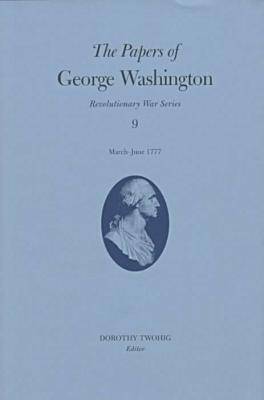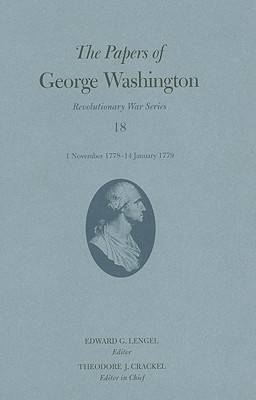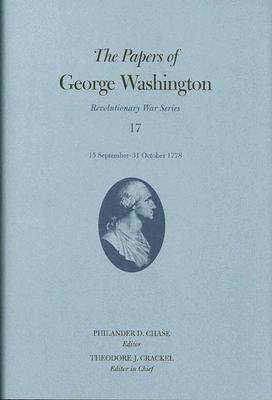Revolutionary War
9 total works
The Papers of George Washington v.3; Revolutionary War Series;Jan.-March 1776
by George Washington, Philander D. Chase, Dorothy Twohig, and Frank E. Grizzard, Jr.
Washington's correspondence and orders for this period reveal an uncompromising attitude toward reconciliation with Britain and a single-minded determination to engage the enemy forces in Boston before the end of the winter. Washington's bold proposal to attack Boston across the frozen back bay in the middle of February was rejected as too risky by a council of war, but the council did approve occupying the strategic Dorchester Heights overlooking the city and harbor. During the last weeks of February and the first days of March, Washington devoted himself to mobilizing artillery and gunpowder for a massive cannonade of Boston and assembling materials for portable fortifications to be erected on the frozen soil of Dorchester Heights. The successful execution of this operation on the night of 4 March failedto provoke General William Howe into assaulting the American lines and thereby open the way to counterattack on the city as Washington hoped it would. It did, however, compel the British to withdraw from Boston in haste a few days later, giving Washington and his army a spirit of confidence with which to embark on the New York campaign. The volume also includes a number of documents relating to Washington's private affairs in Virginia, the most important of which are eight letters from his Mount Vernon manager Lund Washington.
The Papers of George Washington v.9; March-June, 1777;March-June, 1777
by George Washington
Volume 9 covers the spring of 1777, a period when Washington's resourcefulness and perseverance were tested as much as at any time during the war. Instead of opening the new campaign by taking the field with a reinvigorated Continental army as planned, Washington was obliged to spend much of his time pleading with state authorities to fill their recruiting quotas and with officers to bring in the men whom they had enlisted. He was further hampered by a high desertion rate, which he blamed on the failure of many officers to pay their men regularly.
Painfully aware of the weakness of his army, Washington was puzzled but relieved that General Howe did not launch a major offensive during the spring. Although British raids on Peekskill, N.Y., Boundbrook, N.J., and Danbury, Conn., stirred local fears, Washington remained focused on the larger threat posed by Howe's forces. Employing a network of spies, Washington attempted to discover whether Howe planned to attack the strategically important Hudson highlands or politically important Philadelphia, and if the latter, whether he intended to move by land or sea. Believing that Philadelphia would be Howe's target but unable to prove it, Washington concentrated most of his forces at Middlebrook, N.J., in late May, in order to be able to move rapidly north or south as events dictated.
Unhappy officers added to Washington's woes with complaints of ill treatment and threats to resign. "It seems to me," Washington wrote John Hancock in April, "as if all public Spirit was sunk into the means of making money by the Service, or quarrelling upon the most trivial points of rank." Foreign officers, who arrived in unprecedented numbers, were the most troublesome. Often unable to speak English and having little attachment to the American cause, they demanded extravagant ranks and pay that could not be granted without disrupting and demoralizing the Continental officer corps. "The management of this matter," Washington wrote Richard Henry Lee in May, "is a delicate point.... In the mean while I am Haunted and teazed to death by the importunity of some & dissatisfaction of others."
The Papers of George Washington v.8; Revolutionary War Series;January-March 1777
by George Washington
Volume 8 documents Washington's first winter at Morristown. Situated in the hills of north central New Jersey, Morristown offered protection against the British army headquarters in New York City yet enabled Washington to annoy the principal enemy outposts at Newark, Perth Amboy, and New Brunswick. To discover Howe's intentions for the next campaign, Washington refined his intelligence-gathering network in New Jersey and New York during the winter months and kept a watchful, if distant, eye on the British armies in Rhode Island and Canada.
Most of the remainder of Washington's time and efforts were directed toward the reorganization of the continental army, which dwindled away rapidly following the victories at Trenton and Princeton. Unwilling to face the usual hardships of winter or the dangers of a new outbreak of smallpox, many men returned home when their enlistments expired. Desertion also rose dramatically, and Washington was reluctantly forced to depend upon militia. By mid-March Washington's army in New Jersey numbered only about 4,000 troops, nearly two-thirds of which were militia enlisted only to the end of the month.
Other important matters demanding Washington's attention included the reorganization of the hospital department and the creation of new hospitals, the reorganization of the commissary and clothier generals departments, the appointment of a wagonmaster, the establishment and placement of a new "Magazine, Laboratories, & Foundery for casting Cannon &c.," and continuing negotiations with the British on prisoner exchanges. The volume closes in late March with the good news that a much-anticipated shipment of arms, ammunition, and cloth had arrived from France for the Continental army.
The Papers of George Washington v.7; Revolutionary War Series;October 1776-January 1777
by George Washington
Volume 7 documents the dramatic events of the New York campaign and the ensuing New Jersey campaign, a seemingly endless string of American reverses and retreats terminated by surprising victories at Trenton and Princeton. The volume opens with Washington's withdrawal of most of his army from Manhattan Island north to White Plains, where on 28 October British and Hessian troops routed the American right wing on Chatterton hill. Although Washington subsequently succeeded in blocking any further British advance to the north, his indecisiveness about ordering the evacuation of Fort Washington, the sole remaining American post on Manhattan Island, led to the disastrous loss of the fort's large garrison and many valuable stores when General Howe's forces overran it on 16 November.
After the fall of Fort Lee on the west bank of the Hudson River four days later, Washington began retreating across New Jersey with his rapidly dwindling army. His repeated appeals for reinforcement by local militia and Continental troops remaining in New York fell largely on deaf ears, and in early December Washington was obliged to cross the Delaware River into Pennsylvania, leaving New Jersey in enemy hands. From his Bucks County Headquarters Washington wrote his brother Samuel on 18 December: "If every nerve is not strained to recruit the New Army with all possible Expedition I think the game is pretty near up.... No Man I believe ever had a greater choice of difficulties & less the means of extricating himself than I have--However under a full perswation of the justice of our Cause I cannot but think the prospect will brighten." Washington's optimism was justified by his subsequent actions. His daring counterstrokes against a Hessian brigade at Trenton on 27 December and a British detachment at Princeton on 3 January not only reversed the strategic situation but also turned the tide of political defection that had theatened to engulf the middle states.
The Papers of George Washington December 1777-February 1778
by George Washington
Volume 13 of the Revolutionary War Series documents a crucial portion of the winter encampment at Valley Forge, Pennsylvania, when the fate of Washington's army hung in the balance. The volume begins with Washington's soldiers hard at work erecting log huts to the general's specifications and building a bridge over the Schuylkill River under the direction of Major General John Sullivan. Most of the fighting that characterized the bloody year of 1777 had drawn to a close by Christmas, and although British foraging and raiding parties ventured out of Philadelphia from time to time, Washington's priority was no longer to fight General William Howe but to preserve his own army and prepare it for the next campaign.
The American army was badly in need of reform. Attrition and ineffective recruitment had left most of the Continental regiments dangerously weak, and the rising pace of officer resignations made apparent the need for an equitable pay and pensionary establishment. At the same time the battle losses of the previous summer and autumn had exposed severe problems in military organization, drill, and discipline. Washington hoped that a congressional camp committee would rectify some of these problems, and after consulting his officers on army organization, he submitted to the committee one of the longest, most detailed, and most thoughtful letters he ever wrote. The arrival in camp of a Prussian volunteer who styled himself the Baron von Steuben, meanwhile, promised to bring about improvements in drill and discipline. Washington also had to look to his own authority, as a dispute with Major Generals Thomas Conway and Horatio Gates seemingly threatened to undermine his command of the Continental army.
The turning point of the Valley Forge encampment came in February 1778, when a provision shortage led to what Washington called a "fatal crisis" that threatened the continued existence of the army. Poor management of the commissary department and a breakdown of transport, resulting from bad weather and an insufficiency of wagons, combined to bring about a logistical collapse that brought provision supplies almost to a halt. For many days bread was scarce and meat almost nonexistent. Soldiers, many dressed literally in rags because of the incompetence of the clothier general, threatened mutiny. Washington's efforts to save his army in this crisis mark one of the highest points of his military career and make up an important part of this volume.
The Papers of George Washington 1 November 1778 - 14 January 1779
by George Washington
The Papers of George Washington 15 September-31 October 1778
by George Washington
Unlike previous winter encampments, Washington separated his command to avoid undue pressure on any one place for food and forage, as well as to protect strategic points. The distressing situation in the southern department was also a concern, as Major General Nathanael Greene traveled to take command of the shattered army and relayed discouraging reports on the lack of immediate assistance in the form of troops or supplies. Washington, who assured his anxious subordinate in a private letter written on 13 Dec. that "the great public" was not "so unreasonable as to expect impossibilities," did all he could to put men and material at Greene’s disposal and shared the ominous news that a British expedition had sailed from New York in late December.
Washington and Major General Lafayette, who sought additional support from his French countrymen and from increasingly sympathetic European countries, both realized that overzealousness in diplomacy could be counterproductive. Meanwhile, a new congressional establishment of the Continental army adopted in October and promulgated in the general orders for 1 Nov. buoyed Washington’s optimism, and he welcomed Martha Washington’s arrival at his winter headquarters and penned a rare joke involving Greene’s son approaching his first birthday in a letter to that general’s wife, Catharine.
Throughout these tumultuous times, rather than become unpleasant and brittle, Washington demonstrated emotional and mental balance, attributes essential to the eventual success of the revolutionary cause.



